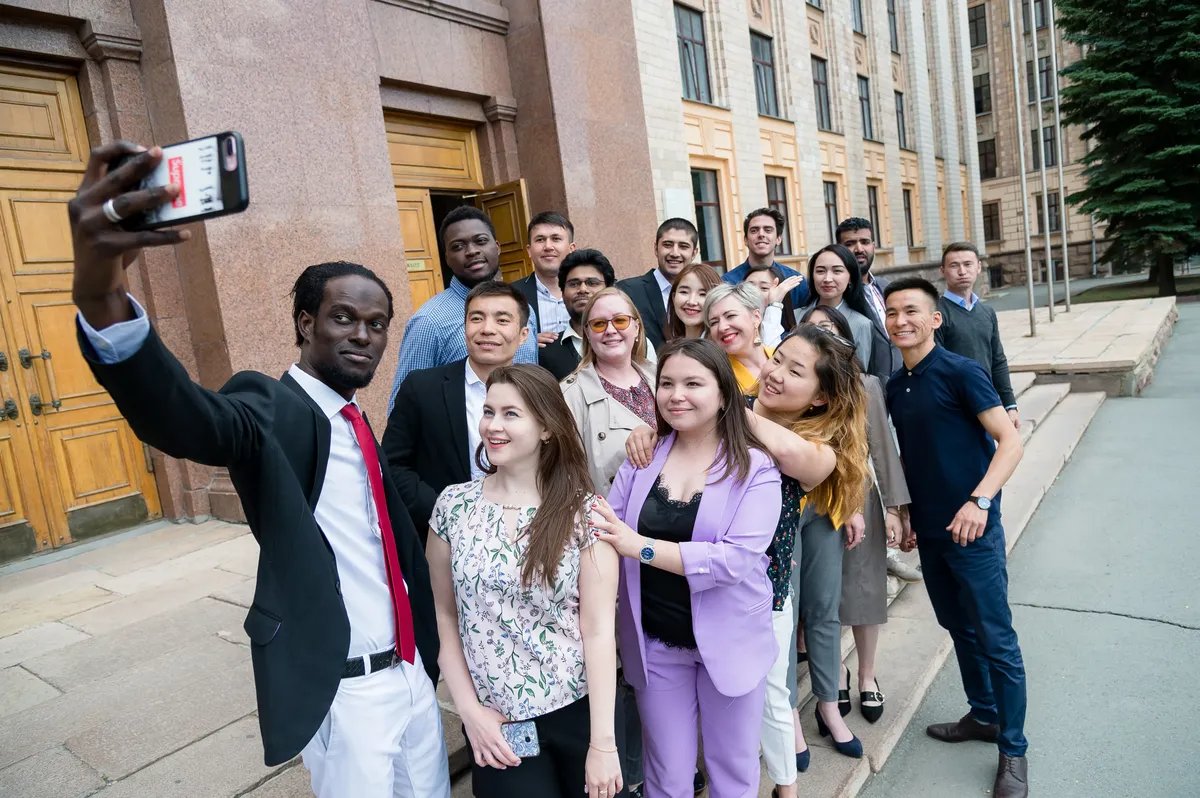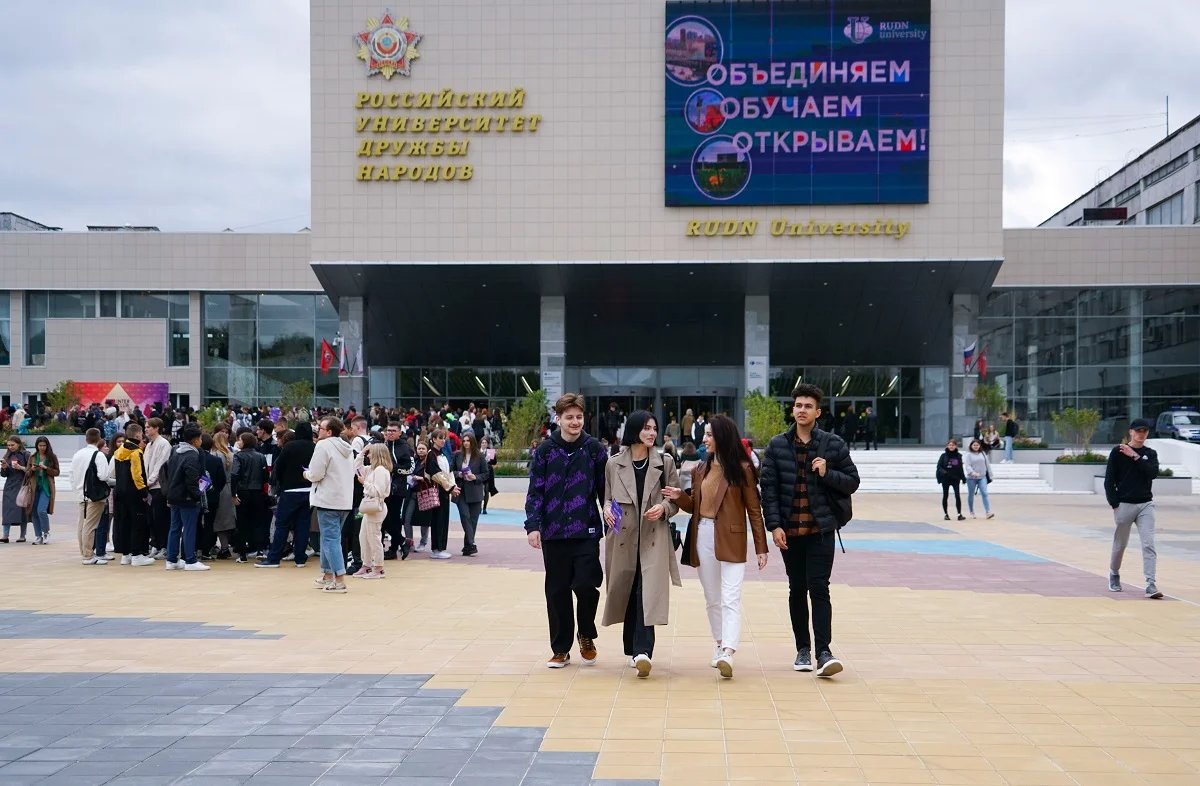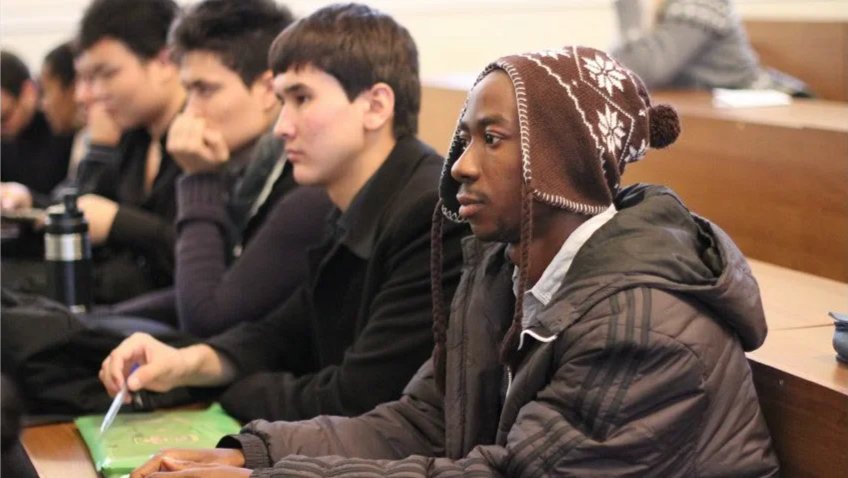The number of international students attending Russian universities reached a new high of 351,500 last year, an 8% increase on the figure from 2021. This rise, no small feat given Russia’s increasing international isolation over the war in Ukraine, appears largely due to the Education Ministry’s decision to expand university quotas for foreigners and to introduce programmes to help overseas students finance their studies.
In 2021, Russia’s Education Ministry announced plans to raise the country’s foreign student quota from 17,000 to 30,000 by 2023, and Russia now has the sixth largest number of foreign students in the world studying in its universities, outranked only by the US (which has almost a million international students), the UK, Canada, France, and Australia.
The extra places have proved easy to fill, largely due to their price tag — the current exchange rate means that Russian tuition fees have become much more affordable. Moscow State University’s Faculty of Journalism currently charges around $5,000 per year, for example, while recent figures suggest that 15,000 foreign students receive scholarships or study grants of some kind.
For most foreign students, accommodation costs are negligible, with undergraduates at Moscow’s Higher School of Economics paying as little as 1,000 rubles (€10) per month for a bed in a student dormitory.
Foreigners enrolling at Russian universities tend to come primarily from former Soviet republics or countries in Asia, with students from Kazakhstan making up the largest number from any one country — some 62,500 in early 2023. China provides the second-highest number of foreign students, number just under 40,000, followed by Uzbekistan, Turkmenistan, Tajikistan, India, Egypt, and Belarus. Medicine and engineering, are the most popular fields of study among overseas students, according to the Education Ministry.
The quality of the education these students receive is not always consistent, however.
The QS World University Ranking, which assesses universities based on the quality of the research they produce and the graduate career prospects, included just one Russian university in its ranking list this year.
Moscow’s Higher School of Economics (HSE) came in at 399, having dropped 100 places since 2021. The HSE also made The Times Higher Education’s list of top 100 law universities in 2021 but slipped off it by the following year.
We asked three foreign students attending Russian universities to explain why they opted to study in Russia and how they would describe their experiences so far. All their names have been changed at their request.

Photo: South Ural State University
Isidor, a third-year linguistics student at Moscow’s Higher School of Economics from Latvia:
"I study here free of charge thanks to the international student quota. And, of course, I found it really attractive that there was no language or cultural barrier here at the HSE. In general, everyone told me that HSE was a great option: the programme is good, there are many travel opportunities, and the people — I knew a couple of them already — are cool. All of that turned out to be true, so I don’t have any regrets.
I studied for a year at a Latvian university before I came here, but I didn’t enjoy studying in Latvian. Also, theoretical linguistics isn’t taught in Latvia, so Russia is on another level. Many Russian students ask me why I chose to come to Russia and why I’m still here. They are mostly respectful, though they sometimes they make inoffensive jokes about Latvians. I haven’t really had any negative experiences.
As for the war, I remember talking about it with my roommate on 21 February [2022], and we agreed that something was about to happen. The morning of the 24 February, we read the news, but we weren’t really scared — there was a feeling of apprehension, it felt like something of global importance was happening, and we were sort of a part of it. My mum texted me and asked me if I wanted to leave Russia. But I said I didn’t want to. I like it here.
I think the war hasn’t been as hard for me as it has been for a lot of Russians. I know many Russians became depressed when the whole thing started, but maybe it’s just that I don’t identify as a part of this country that much. And I also knew I had a place to go, if necessary.
I’m certain that we’ll have career prospects. I haven’t heard about anyone being rejected from a master’s programme for having a Russian bachelor’s diploma. Attending conferences is also not a problem. People in academia understand what’s going on, and everyone is welcome.
We have an objectively strong programme here, so people abroad are interested in us. My plan for the future is to be a researcher. Once I’m done with my bachelor’s degree, I think I’ll do my master’s in Europe, and then maybe a PhD in the US. I’m definitely going to leave Russia anyway. I want to gain some experience elsewhere, in a different country with a higher quality of life, I think."

Photo: RUDN University
Susie, a fourth-year journalism student at Moscow State University from China:
"I think the education in Russia is good, but not as good as it should be. I’ve studied the theoretical basics in my field already, and I wanted a more practice-oriented approach to see things from various angles. In China, when someone hears you have a tech or science degree from a renowned Russian university, they generally think you have great career prospects. But once they hear you have a social studies degree, they’re a little more sceptical.
I think most of the Chinese students who come to Russia to study do so because it’s easy to enrol and because the cost of living is low here.
Another important reason is the friendly relationship between our governments. Most Chinese people don’t know much about studying in Europe outside the UK, so they tend to choose Russia.
I think [international students] are treated fairly here. We have the same syllabus and the same teachers as the Russian students. One of my teachers organises extracurricular activities for foreign students, and she is very warm and friendly.
There is some prejudice as well, though, especially when it comes to accommodation, and it’s not just at our university: students from China often get assigned worse dormitories."
Anna, a second-year design student at Kosygin State University from Macedonia:
"I started a fashion design programme in 2022. I’ve always wanted to be a fashion designer, and my university has a good programme. I arrived in Russia after the war in Ukraine had already started. Of course, I can’t believe that civilised people still use war as a means of solving problems. I was always taught that negotiation is the best solution. Nonetheless, I’m a student in Russia.
It’s cold here, and I often cry when I’m on the metro, but otherwise it’s more or less okay. I’ve made friends with the cockroaches in my dormitory. Despite the cold temperatures, the people here are warm. I haven’t met any other Macedonians at my university, but I have some friends in Macedonia who are planning to study in Russia in the future. I think my education will give me good career prospects."
Join us in rebuilding Novaya Gazeta Europe
The Russian government has banned independent media. We were forced to leave our country in order to keep doing our job, telling our readers about what is going on Russia, Ukraine and Europe.
We will continue fighting against warfare and dictatorship. We believe that freedom of speech is the most efficient antidote against tyranny. Support us financially to help us fight for peace and freedom.
By clicking the Support button, you agree to the processing of your personal data.
To cancel a regular donation, please write to [email protected]

